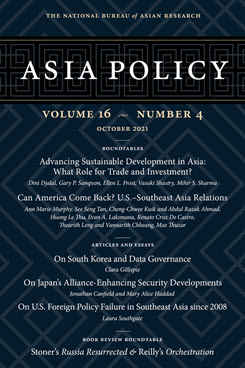The WTO, Trade Agreements, and Sustainable Trade
The Asian Experience
This essay highlights how trade policies and sustainable development are inextricably connected. It selectively focuses on links of importance to Asian countries, the WTO, and the United Nation’s 2030 Agenda for Sustainable Development.
This roundtable was made possible by the generous support of the Hinrich Foundation.
EXECUTIVE SUMMARY
MAIN ARGUMENT
The evolution of the world trading system over the past half century has significantly changed the relationship between trade and sustainable development. The principal link comes from trade liberalization, which promotes growth and provides additional resources to advance sustainable development. Nowhere has this played a larger role than in Asia’s economic transformation and with it the rise of millions out of poverty. For this link to be positive, a global trading system is needed with rules that support sustainable development while leaving the policy space to permit the appropriate national choices to be pursued. The WTO has a central role to play in achieving sustainable development. It has been greatly weakened in past years, but recent events indicate that the time is ripe to strengthen its rules to enhance its contribution to sustainable development.
POLICY IMPLICATIONS
- The strengthening and reform of the WTO should be undertaken with a clear understanding of the interface between trade rules and the goals of sustainable development as well as the many options available to modify or create trade agreements. What is needed is an inventory of useful potential rule changes and the options available.
- The reduction of trade barriers and the ensuing trade expansion will remain essential to promoting the growth and development of the Asian economies. In Asia, as elsewhere, expanded resources improve standards of living and reduce poverty while providing the means to protect and preserve the environment.
- Numerous WTO and intergovernmental declarations stress the need for greater coherence and cooperation in global policymaking. Given the interdisciplinary nature of sustainable development and the overlap between trade and sustainable development, governments and organizations should make efforts to ensure the convergences of these policies are constructively exploited.
Gary P. Sampson is a Professor of International Trade at Melbourne Business School at the University of Melbourne (Australia). He was formerly director at the GATT and WTO, as well as senior counsellor to the WTO director general.
About Asia Policy
Asia Policy is a peer-reviewed scholarly journal presenting policy-relevant academic research on the Asia-Pacific that draws clear and concise conclusions useful to today’s policymakers. Asia Policy is published quarterly in January, April, July, and October and accepts submissions on a rolling basis. Learn more


